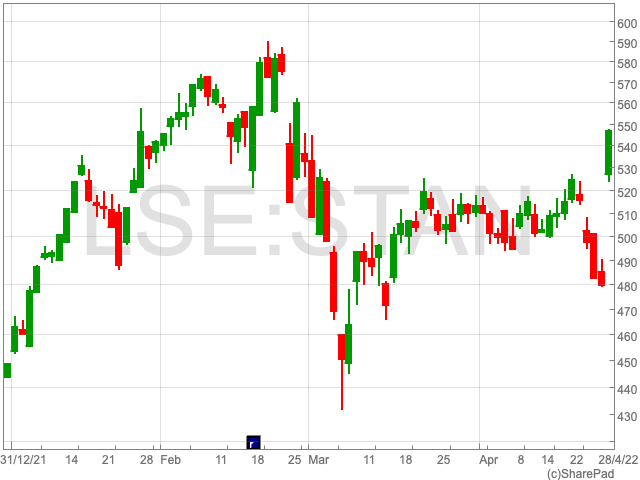Standard Chartered raised its annual income growth outlook as a result of improving margins reported in its first-quarter results which led the bank’s shares to gain 14% to 546p on Thursday.
Standard Chartered’s net interest income rose 8% to $1.79bn from $1.66bn, while other income was 10% higher at $2.5bn from $2.28bn in the first quarter of 2022 compared to the first quarter of 2021 as a result of rising interest rates and increased hedging balances within Treasury
Standard Chartered reported a 9% rise in its statutory operating income which rose from $3.94bn to $4.29bn in Q1 2022 and the group’s cost to income ratio decreased from 64.2% to 62.1%.
The driver behind the rise in operating income was a “record Financial Markets performance” and the expansion in the net interest margin which was partly offset by lower Wealth Management income.
The company recorded a higher credit impairment from $17m to $200m in line with the charges in the prior quarter, indicating that the bank has begun to build credit reserves once again in 2022.
The impact of a $104m reduction in management overlays, largely linked to COVID-19, was reflected in an $81m release in Stage 1 and 2 impairments.
A $281m charge was incurred due to the impairment of Stage 3 assets, which included a $107m effect from a sovereign rating downgrade of Sri Lanka to stage 3, as well as a $160m charge on China Commercial Real Estate exposures.
The bank recorded a pretax profit of $1.49bn, up 6% from $1.41bn in Q1 2021, where profit from associates and joint ventures contributed $68m due to increased profits at China Bohai Bank.
The group’s profit attributable to ordinary shareholders increased 3% from $1.02bn to $1.05bn in the bank’s first-quarter results.
Standard Chartered’s loans and advances to the customer were reported to be $296bn from $292bn seeing a 1% increase from 2021.
The bank’s adjusted net interest margin jumped 7bps to 1.29% from 1.22% and its liquidity coverage ratio fell 10bps from 150 to 140 in Q1 2022.
Standard Chartered’s NAV per share rose $0.27 to $14.60 and tangible NAV increased by $0.06 to $12.76 in the first quarter.
The group’s ended March 31 with a CET1 ratio of 13.9%, slipping from 14.0%, and RWA declined by $10m to $261bn, however, EPS increased 4% to $0.34.
Operating Income by Product
Transaction Banking income increased 4% to $740m with Trade and Working Capital generating $363m followed by Cash Management which generated $378m as they were partly offset by margin compression for Standard Chartered.
Financial Markets income increased 32% to $1.72bn with Macro Trading seeing a 40% rise as the group’s Commodity income more than doubled due to volatility in energy prices, and FX and Rates income also saw double-digit growth due to the increased client flows.
Standard Chartered’s Credit Markets income rose 7% to $460m with a 17% rise in Financing Solutions & Issuance which was offset by the 16% decrease in Credit Trading due to being negatively impacted by widening credit spreads.
Due to decreased Aviation Finance income for Standard Chartered, Structured Finance income fell 6%, but Financing & Security Services income rose 35%, including $94m in gains on mark-to-market liabilities, which are likely to reverse once funding spreads normalise.
Standard Chartered reported an income decrease of 16% to $146m in its Lending and Portfolio Management income as RWA optimisation actions led to loan sale losses and lower balances in Q1.
As market circumstances got more volatile, transaction volumes decreased, and the impact of COVID-19 restrictions, particularly in Hong Kong and China, resulted in several branch closures, affecting face-to-face sales, the group’s Wealth Management income fell 18% to $530m in the first quarter of 2022.
Standard Chartered’s Retail Products income was flat at $849m with Deposit income rising 6% due to higher margins, increased volumes and improved liability mix and Mortgages & Auto income grew 3%. The lower fee income in Hong Kong led to a 5% fall in Credit Cards and Personal Loans income.
The group’s Treasury income rose 23% as net interest income more than doubled due to an increase in hedged balances and an increased return on assets as interest rates rose in several markets, however, it was partly offset by a $68m reduction in realisation gains.
Operating Income by Region
Asia profits fell 26%, owing to a $227m increase in credit impairments and a 6% increase in expenses, however, profits in Africa and the Middle East climbed by 59% as revenue increased by 12% said Standard Chartered.
Due to robust Financial Markets and Treasury performance, earnings in Europe and the Americas more than quadrupled, with income up 56%.
Central & other regions lost $221m due to greater expenses and a non-repeat of the prior year’s other impairment linked to the aviation leasing portfolio.
Standard Chartered Outlook
Standard Chartered has raised its outlook for 2022 as a result of the bank’s “strong” start to the year.
The previously guided 5-7% range for income growth is projected to be somewhat exceeded.
Due to the sheer impact of greater income growth projections on performance-related pay, operating expenses are estimated to be somewhat higher than the previously guided $10.7bn and the group continues to expect positive income-to-cost jaws.
Credit impairment is likely to begin to normalise towards the 30-35 basis point medium-term loan-loss rate range said Standard Chartered.
The group wants to operate dynamically within the CET1 target range of 13-14% and expects to achieve a 10% return on tangible equity by 2024, if not sooner.

Bill Winters, Group Chief Executive, Standard Chartered said, “Our first quarter performance was strong despite the volatile macro environment.”
“Our profit before tax grew 4% year on year, with strong underlying business momentum. I am also pleased by the early progress we have made against the five strategic actions we outlined in February and we are on track to deliver 10% return on tangible equity by 2024, if not earlier.”
